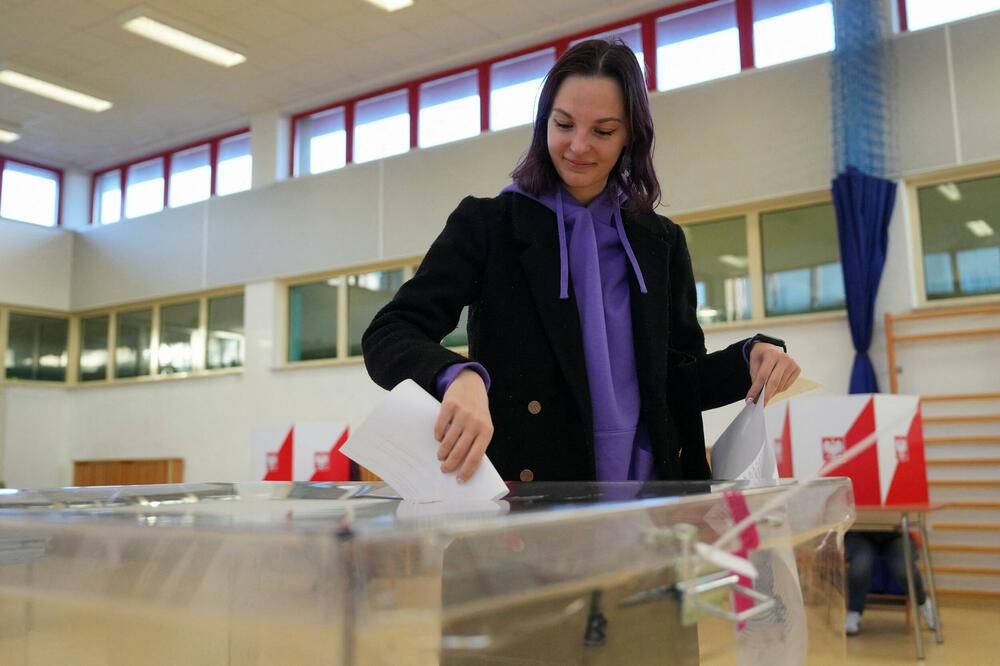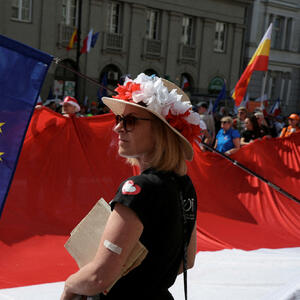In Poland, the regular parliamentary elections for 460 deputies and 100 senators began today, which the authorities, despite the opposition's boycott, combined with what is considered a controversial referendum on Muslim migrants.
The government and the opposition mark these elections as fateful, the most important since the fall of the communists in 1989.
The elections started yesterday abroad with long lines in front of Polish embassies and consulates as a record number of more than 600.000 Poles in the diaspora out of a total of over 29 million registered voters registered to vote, and polls predict a record turnout of over 62 percent.
The Poles decide whether they will allow Jaroslav Kaczynski's conservatives from the Pravo i Pravda party to realize their vision of "Budapest in Warsaw", as Kaczynski announced before the 2015 elections, and to follow the Hungarian model to "change the country so that no one will recognize it anymore", as promises before these elections.
A third victory in the parliamentary elections would allow the united right, Prav i Pravda and the small coalition partner Sovereign Poland to complete the reforms in the media, institutions, public enterprises and above all in the judiciary, which have kept Warsaw in a sharp dispute with the European Union for years and have threatened the rule of law. 36 billion euros from the Reconstruction Fund were frozen after the pandemic.
The opposition, led by the liberal Civic Coalition of the former Polish Prime Minister and former President of the European Council, Donald Tusk, has therefore announced as one of its campaign slogans an appeal to Poles, especially young people, to go out to vote because this may be the last time their vote means anything at all.
Elections based on the proportional electoral system for the lower house, the Sejm, and on the majority for the upper house, the Senate, are held after an unprecedentedly brutal election campaign full of verbal and physical violence and fake news, which further deepened the divisions and fears of Poles while mobilizing them to vote. against the opposition and Tusk, who, according to Kačinjski, is "pure evil", a referendum should also serve.
The questions are formulated in such a way that the majority of the opposition voters would answer them as the ruling party wants four times no. Not for Poland to be flooded by tens of thousands of migrants from Africa and the Middle East that the EU allegedly wants to deliberately send to Poland, not for the demolition of the fence on the border with Belarus and Russia with which the Polish authorities are trying to block the eastern refugee route, not for the sale of public enterprises to foreigners so that Poles lose control over a strategic sector of the economy and do not raise the retirement age to 67.
Relations with the neighbors are at stake in these elections, since the Polish state leadership declared in the campaign that the main enemy is not Russia but Germany, and it represents the opposition and Tusk as mere puppets of Brussels and Berlin.
Relations with Ukraine and aid to its neighbor in the war were sacrificed in the pursuit of the votes of sympathizers of radical nationalists from the Confederation party whose program is a Poland without Jews, Muslim refugees and the immediate suspension of all aid to Ukraine and refugees who sought salvation from the war in Poland.
Along with the apprehension that an electoral stalemate awaits Poland, because the new government will be decided by the results of smaller parties that are potential partners of the two main ones, Prava i Pravda and the Civic Coalition, there is also apprehension about whether the elections will be fair, since the government accepted observers from the OSCE and the Council of Europe, but it does not often allow them to attend its meetings, and it refused to accredit observers from non-governmental organizations for human rights.
About 100.000 volunteers applied to the opposition to monitor and control the elections at the polling stations this year.
The spokesman of the Ministry of Foreign Affairs, Lukaš Jašina, was urgently dismissed yesterday because he admitted to the media that a good part of the votes from the diaspora could fail, since some election commissions at polling stations abroad will not technically be able to count all the votes within 24 hours, which is unexpected year ordered by the State Election Commission, and if they are not counted, they fail.
The main Polish television stations will announce the forecast of the results tonight, right after the polls close at 21:XNUMX p.m., until Monday morning, as well as the precise models, and the official results will be announced by the State Election Commission on Tuesday.
The President of Poland, Andrzej Duda, has already announced that he will not give the mandate to form the government to whoever has the majority in the parliament, as is the custom in Central European countries, but to the party that individually wins the highest percentage of votes, which according to all polls is his party Pravo i Pravda.
Bonus video:





